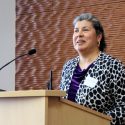Educational Innovation funding awarded for 21 projects
Funding has been awarded for 21 projects that continue to advance UW’s commitment to Educational Innovation.
Nearly 80 pre-proposals for funding were originally submitted from 53 departments and 14 schools, colleges and units.
Those that were chosen represent a variety of topics including virtual anatomy instruction, virtual patient advocacy, flipping classrooms and blended learning, re-thinking cross department collaboration, interprofessional education, virtual physics, online professional masters, online chemistry labs, web math, interdisciplinary approach to teaching Jewish culture and more.
“We were very pleased with the level of interest across the campus,” says Chris Olsen, Interim Vice Provost for Teaching and Learning. “And we were thrilled to be able to ultimately fund 21 proposals. These span a wealth of different forms of innovations, some strongly technology focused and some not. In total, students and instructors will have opportunities to experiment together with an intriguing set of new approaches to teaching and learning.”
The projects are part of Educational Innovation, a campus-wide initiative to create innovative approaches to education and research and set the university on the path to greater self-sufficiency. Over the past year, a greater emphasis has been placed on looking at new ways to innovate and to encourage an environment where people are always thinking of different and better ways to do things.
Some of those accomplishments can be seen on the EI web site, http://edinnovation.wisc.edu, which also provides resources for how to implement innovation.
Recently, six faculty members were awarded EI funds designed to provide them the opportunity to extend their sabbatical plans to further an educational innovation project.
In February, UW announced the launch of four pilot courses as part of a new delivery system in higher education known as Massive Open Online Courses (MOOCs). Two of them are scheduled to begin this fall, with the others to follow.
All of the EI projects were chosen based on their inventiveness, ability to reach more learners and develop innovative programs to generate new resources or savings.
“We’re pleased to continue the momentum that has been building for Educational Innovation by supporting these 21 competitively selected projects,” says Provost Paul M. DeLuca Jr. “This is a wonderful example of the Wisconsin Idea at work and will greatly benefit our students, whether on our campus or taking part in one of the online courses.”
The projects are:
• “Chemical Engineering Online: Blended Learning in Foundation Courses,” project lead, Professor Dan Klingenberg, Department of Chemical and Biological Engineering
• “Creating a Virtual Center for Advanced Nutrition in Techniques and Tools to Enhance the Well-being of Dairy Cows and Calves,” project lead, Associate Professor Nigel B. Cook, Department of Medical Sciences
• “Geodesign Capstone Certificate Program,” project lead, Professor Janet Silbernagel, Department of Landscape Architecture
• “Video Course Development for Large Lecture Chemistry Courses,” project lead, Senior Instructional Specialist Jim Maynard, Department of Chemistry
• “Case Scenario & Critical Reader Builder,” project lead, Senior Instructional Design Consultant Les Howles, DoIt Academic Technology
• “Post-professional Occupational Therapy Doctorate,” project lead, Associate Professor Ruth E. Benedict, Department of Kinesiology, Occupational Therapy Program
• “Yiddish Song and the Jewish Experience: A Blended Learning and Online Course,” project lead, Professor Pamela Potter, Department of Jewish Studies, School of Music
• “Web Computational Geometry,” project lead, Professor Vadim Shapiro, Department of Mechanical Engineering, Computer Science, Industrial Engineering
• “Masters in Special Education – Uonline Model,” project lead, Professor Kimber Wilkerson, Department of Rehabilitation Psychology and Special Education
• “Big Data Analytics Professional Certificate and Masters,” project lead, Professor Brian Yandell, Department of Statistics and Computer Science
• “eLearning Innovations: Tools to Support Online Teaching and Learning,” project lead, Dr. Kathleen A. O’Connell, Center for Patient Partnerships
• “Interactive Virtual Simulation in Human Anatomy: Applications of Clinically Relevant Integrated Advanced Imaging Modules in Anatomy Education,” project lead, Professor Lonie Salkowski, Department of Radiology, Neuroscience, Medical Physics and Medical Education
• “Creating an Online Laboratory for Environmental Chemistry: Water Analysis through Educational Innovation,” project lead, Associate Professor James Hurley, Department of Civil and Environmental Engineering, Environmental Chemistry Program
• “Interprofessional Education for Health Profession Students Utilizing the Case Scenario/Critical Reader Builder to Create a Shared Virtual Interactions with Patients,” project lead, Clinical Assistant Professor Steven G. Oakes, School of Pharmacy
• “Interprofessionalism Simulation-Based Team Training for Health Professional Students,” project lead, Associate Dean Elizabeth M. Petty, School of Medicine and Public Health
• “’Flipping’ PS 566: Contemporary American Political Thought,” project lead, Professor John Zumbrunnen, Political Science
• “Computational Social Scientific and Data Visualization Tools for Journalists and Communication Researchers,” project lead, Assistant Professor Christopher Wells, School of Library and Information Studies, Journalism and Mass Communication
• “Innovation in Education: Enhancing and Expanding the University of Wisconsin’s Prevention and Intervention Sciences Program,” project lead, Associate Professor Craig A. Albers, Educational Psychology
• “Flexible Physics Mobile,” project lead, Professor Duncan Carlsmith, Physics
• “A New Curriculum Model for Selectives during the DVM Program,” project lead, Interim Associate Dean for Academic Affairs Lynn Maki, School-wide, including all four academic departments
• “The Wisconsin Information and Communication Initiative,” project lead, Kristin Eschenfelder, School of Library and Information Studies, Communication Arts



